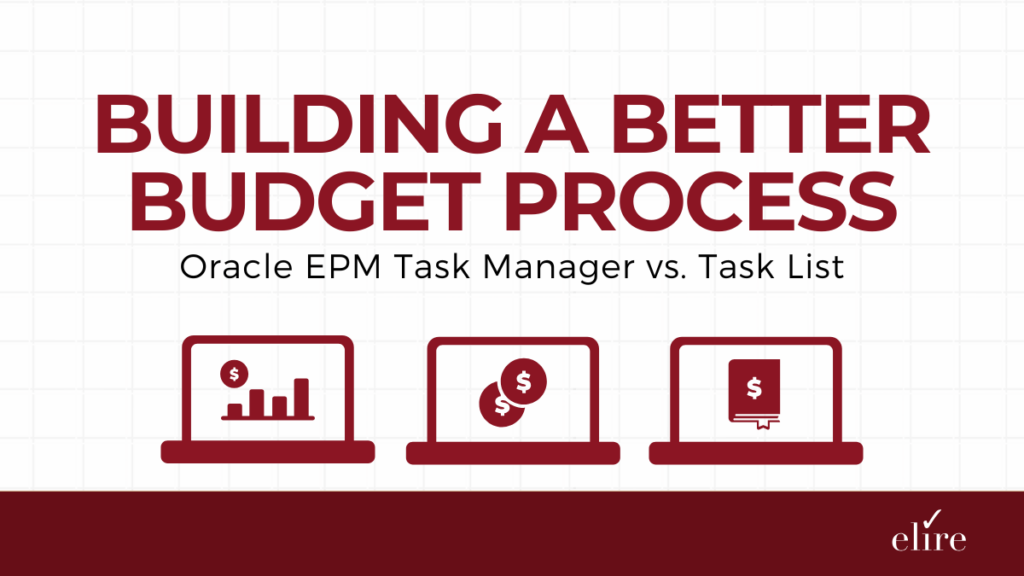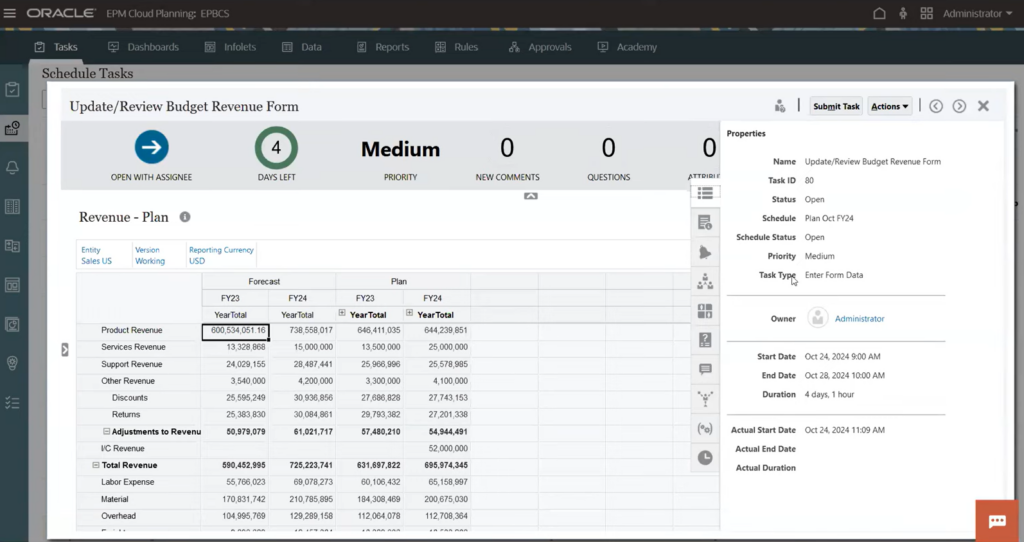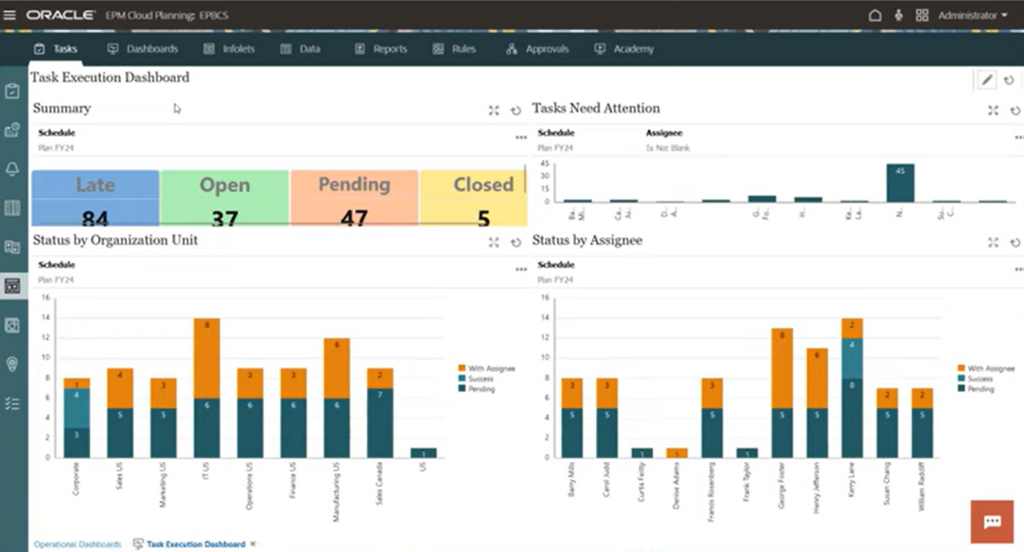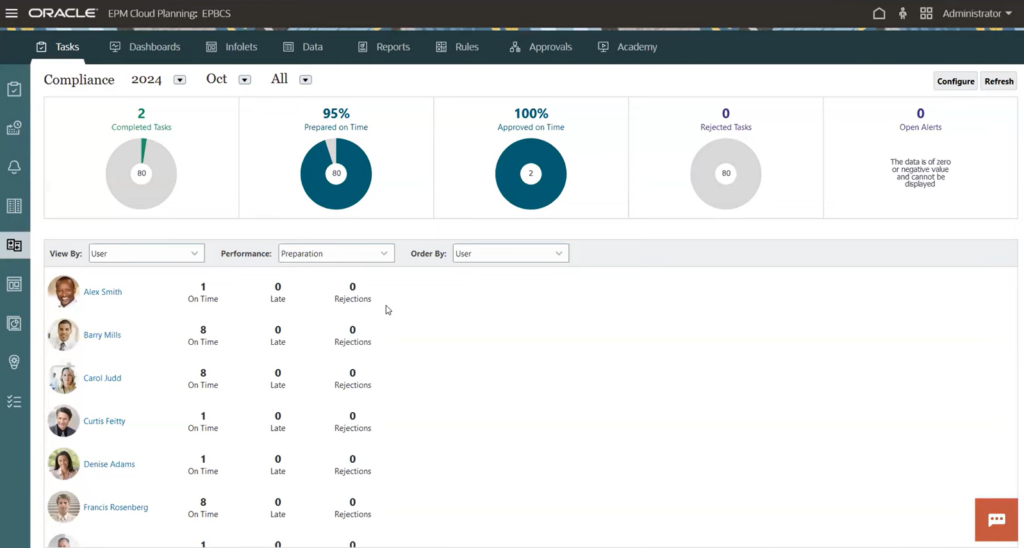
Effective management of budget and forecast processes is essential for organizations looking to optimize their financial performance and streamline operational workflows. Oracle Cloud EPM provides powerful tools to assist in this – namely, Task Lists and Task Manager. While both solutions aim to improve process management, Oracle EPM Task Manager brings advanced functionalities that make it a valuable upgrade over traditional Task Lists. Here’s a deep dive into the differences and benefits each tool provides.
Task Lists: A Structured Yet Limited Approach
Task Lists in Oracle Cloud EPM act as a series of repeatable steps, guiding users through budget and forecast processes. Each task can involve data entry, report review, business rule execution, or application refresh. Although Task Lists offer a structured and straightforward way to guide users, they lack flexibility and robust tracking capabilities that would better support more complex or evolving business processes.
For example, Task Lists only allow users to filter tasks by completion status (e.g., complete, incomplete, or overdue). This limitation restricts visibility into process progression, making it harder for managers to oversee all ongoing tasks effectively. Additionally, Task Lists lack sophisticated reporting and dashboard functionalities, which limits the organization’s ability to monitor key metrics like task status and completion rates in real time. As discussed during the presentation, many users currently supplement Task Lists with emails or other tools to manually track these elements – a time-consuming workaround.
Key Limitations of Task Lists:
- Limited reporting and dashboard capabilities
- Minimal tracking options for tasks beyond basic status indicators
- Requires manual monitoring and follow-ups to ensure tasks are on track
- Less flexibility in tracking recurring or period-specific tasks
Task Manager: Comprehensive Control and Oversight
Task Manager is designed as a centralized, feature-rich solution that enhances task tracking and process management capabilities, especially for monthly and quarterly close processes. This tool goes beyond basic task assignment, providing extensive features like automated notifications, alerts for overdue tasks, and advanced tracking capabilities that are essential for a smooth, well-organized budget and forecasting cycle.
In Task Manager, users can easily define, execute, and report on various business processes. The tool includes scheduling options and task templates, which help ensure consistency and prevent errors in recurring tasks. For example, in the Task Manager’s scheduling interface, users can create task templates for annual budget or forecast cycles. Once these templates are deployed, users can monitor each task through dashboards that track everything from start and end dates to task assignments and completion statuses.
Noteworthy Features of Task Manager:
- Automated Tracking: Users can track tasks monthly using templates and schedules, ensuring process efficiency without the need for constant manual oversight.
- Dashboards and Reporting: Real-time dashboards offer a high-level view of task statuses, priority levels, and completion rates. The tool also provides visual summaries like pie charts, where users can quickly see open, overdue, or completed tasks.
- Notification and Alerts: Automated alerts and email notifications keep users informed of any delinquencies, due dates, or status changes in tasks, helping to prevent delays and missed deadlines.
- Comprehensive Task Types: Unlike Task Lists, Task Manager offers a wide range of task types, such as data copying, running business rules, data integration, and data load rules, adding flexibility for complex processes.
Practical Example: Creating and Assigning Tasks in Task Manager
Creating and assigning tasks in Task Manager allows users to set task names, IDs, and types, and specify start and end dates, priorities, instructions, and approvers. Each task is associated with a specific template—such as “Annual Budget” or “Forecast Update”—enabling a streamlined setup for recurring processes. By assigning tasks to designated users and setting start and end dates, managers can ensure all steps in the budget cycle are accounted for, from data review to report generation.
For example, a task might be created to review and submit data in a budget form. Users can enter task-specific instructions, attach reference documents, and set notifications for approvers.

Task Manager Update and Review Budget Form
Once the task is deployed, it appears on the user’s Worklist, where they can view all assigned tasks for the current period, filter by priority, and check for any overdue or upcoming tasks. This setup streamlines the user experience, as they no longer need to cross-reference emails or external schedules.
Advanced Dashboards for Effective Task Monitoring

Task Manager Executive Dashboard
The Task Manager dashboard offers a clear advantage over Task Lists by enabling managers to visualize task progress and identify bottlenecks in real time. For instance, the dashboard provides an overview of tasks sorted by priority, schedule, or status. A pie chart might show open, on-time, or late tasks, with clickable links for deeper investigation. Managers can quickly address overdue tasks or reassign responsibilities as necessary, maintaining smooth operations across budget cycles.
To view the Task List to Task Manager demo in real time, navigate to this Oracle EPM Task Manager recording!
Why Task Manager is the Beneficial Choice
The added automation, tracking, and reporting features make Task Manager a strong choice for organizations that require more robust management of their EPM processes. Here are a few reasons Task Manager stands out:
- Enhanced Visibility: Task Manager’s dashboards and reporting tools give finance teams a complete view of the budget process at any moment, supporting real-time decisions
- Process Consistency: With templates and schedules, Task Manager ensures consistency across budget cycles, reducing errors and improving compliance
- Proactive Alerts: Notifications and alerts prevent tasks from slipping through the cracks, ensuring users meet deadlines with minimal manual intervention
- Efficient Collaboration: The ability to assign tasks, set approvers, and track status changes helps teams collaborate more effectively, keeping everyone on the same page

Task Manager Compliance Dashboard
What’s Next
For organizations looking to optimize their budget and forecasting workflows, Oracle Cloud EPM’s Task Manager offers a powerful upgrade from traditional Task Lists. Its extensive tracking, automation, and reporting capabilities provide finance teams with the control and insight needed to manage complex processes efficiently. By reducing the need for manual tracking and enhancing visibility across tasks, Task Manager enables smoother financial operations management and supports long-term growth.
To learn more about Task List vs Task Manager, check out Elire Expert Jenny Wang’s Task List to Task Manager Demo now. Looking to take the next step in adopting EPM Task Manager? Contact [email protected] to chat with one of our Cloud EPM experts.
If you’re interested in other Cloud EPM functionalities, Elire has more EPM insights for you! Take a look at our EPM Lunch and Learn series where we highlight various EPM applications, including ARCS and Narrative Reporting. Subscribe to Elire’s Monthly Cloud Newsletter to stay up to date on all things Oracle EPM! Make sure to follow Elire on LinkedIn and Twitter to receive industry updates directly to your phone.
Authors
-

Ms. Wang is a Senior Consultant specializing in Planning & Analytics with expertise in Oracle Hyperion Planning. With a certification in Oracle Hyperion Planning, Jenny leverages her extensive knowledge to drive strategic financial planning and analytics solutions for clients across diverse industries.
View all posts -

Mrs. Selness serves as Elire’s Marketing Specialist, working to develop and optimize marketing brand assets. Jordan collaborates with the Elire Team to produce blog and social media content, strategize for social media expansion, and maintain Elire’s internal and external branding.
View all posts
